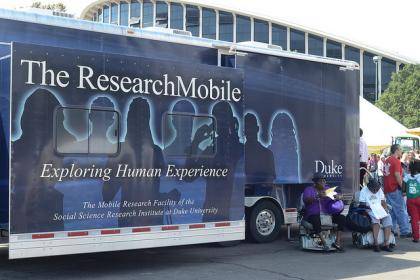
Had the words “Exploring Human Experience” not been painted on the sides, the Social Science Research Institute’s (SSRI) ResearchMobile might pass as a run-of-the-mill trailer. But unlike a typical trailer, the 37-foot mobile lab is decked out with soundproof cubicles equipped with computers, video cameras and equipment for measuring physiological responses to interview questions.
After numerous stops around the Triangle in the past year, the ResearchMobile will cross state lines for the first time Dec. 12 to help a team of student researchers interview South Carolina flood survivors. The 10 students, including two Master of Public Policy (MPP) candidates, will conduct interviews with residents of Columbia, Charleston and the rural communities around Lake Marion under the supervision of Nicholas School Assistant Professor Elizabeth Albright.
Alexandra Cooper, the SSRI’s associate director for education, said that while Albright had already determined a number of key sites for the team to “park” the ResearchMobile, the students would recruit the subjects upon arrival. The students will then work with Albright as part of an Education and Human Development Bass Connections project team in the spring semester to “clean” and process the data collected in the field.
Cooper said this project was exactly what she and others at the SSRI had in mind when they sought funding to develop the ResearchMobile.
“When we were trying to get financial support for [the ResearchMobile], one of the arguments we put forward was that it could be positioned in contexts like the aftermath of a natural disaster,” Cooper said. “The people who have lived through it are not in a position to come to a university to talk about their experiences, so researchers need to go to them.”
The SSRI put out a notice on various faculty email listservs shortly after Hurricane Joaquin created disastrous floods in South Carolina in October. Cooper wanted social scientists interested in flood impact to take advantage of the research vehicle. Albright, who interviewed and surveyed survivors of the 2013 Colorado floods, expressed her interest in putting together a team of student researchers.
“Dr. Albright and I were looking for students who would be comfortable talking to people about these very difficult and traumatic experiences,” Cooper said. “Certainly people who are empathetic and good listeners. Our group is very diverse. Many are interested in environmental science, while several are interested in psychology and how people react to trauma. We even have a couple whose friends and family were affected by the flooding.”
In addition to conducting the interviews, the students will track the subjects’ physiological responses, including heart rate and blood pressure, to questions about their experiences during and after the flood.
Connie Ma, a second-year MPP student and member of the South Carolina team, said she was most excited to engage with research subjects in the field and learn to process qualitative data from interviews in the spring semester.
“What really stood out to me about this flooding research was the chance to gather the data myself,” Ma said. “As I've gotten more involved with policy and data analysis, I have missed working directly with people. I really enjoy interviews where I can help subjects reflect on their experiences.”
Beyond helping the students gain social science research experience out in the field, Cooper hopes that the ResearchMobile’s South Carolina excursion will raise awareness of this resource.
“At SSRI, we try to provide infrastructure that is of general use, and we see the ResearchMobile as infrastructure,” Cooper said. “It’s my hope that, because this project taps into a recent important event, the South Carolina team will increase awareness of the ResearchMobile. We want more faculty from a variety of disciplines to use this resource.”
For more information on SSRI events and resources, click here.